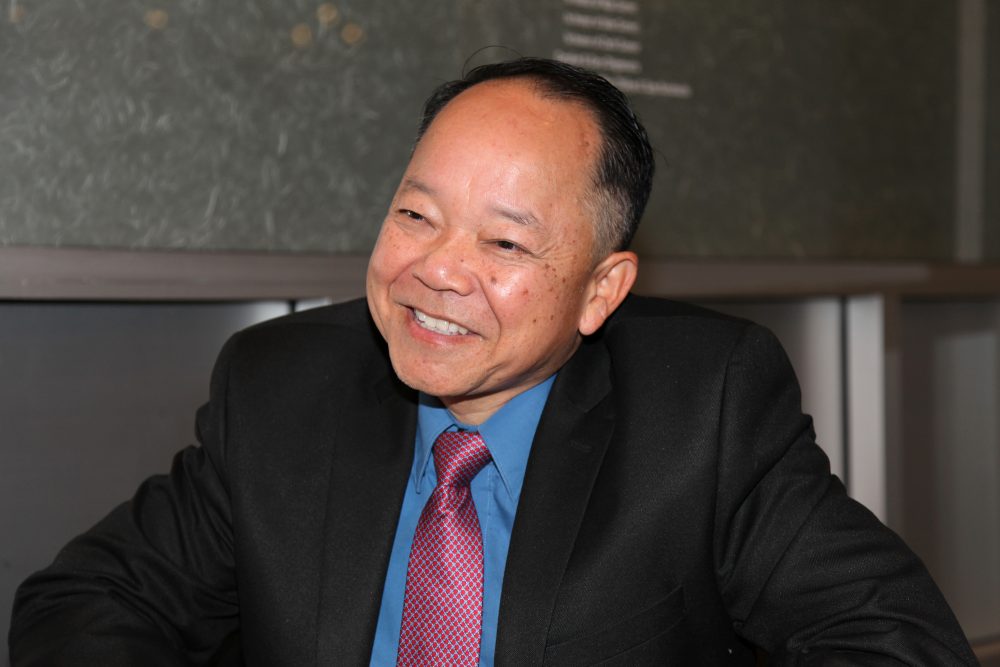
Photo by Aaron Salcido.
Chris Tang is a scholar of business administration at the UCLA Anderson School of Management; his research focuses on global supply chain management, retail markets, and corporate social responsibility. Before taking part in a a Zòcalo/UCLA Anderson School of Management event, “Is China Prepared to Lead the Global Economy?” at the National Center for the Preservation of Democracy in downtown Los Angeles, he chatted in the green room about Donald Trump, Xi Jinping, and the vanished East-West spirit of old Hong Kong.
Was there a teacher or professor who really influenced you—maybe even helped to set a direction for your life?
My adviser, Eric Denardo, at Yale University. He’s truly an inspiring professor. And actually he was the one who encouraged me to pursue my career in academia. I was working at IBM and I wasn’t sure that academics was a career for me, but he encouraged me to give it a try. He said that if I went into academia I would have the option to go back into the industry if I didn’t like it, but if I started the other way round, it would be much more difficult.
Who’s the world’s most powerful person, Donald Trump or Xi Jinping?
That is a tough question. I would say that on a scale of power, Xi Jinping is much more powerful. The main reason is that I think he embodies military power and also policy power, and also given that the culture in China is really top-down; there’s no congress and senate and these kind of check-and-balance mechanisms in place. So one person can make all the decisions for the country.
What are you reading for pleasure?
I don’t have much time for leisure reading, but I bought a book on the power of platforms. The point is that a lot of the phenomenal success of a lot of new startups is that they’re all based on platforms.
You’re from Hong Kong and were educated in the United Kingdom and Yale, and have lived in the United States for 40 years. Are there things you still miss about Hong Kong?
What I miss about Hong Kong is the past, the blend of the British influence and also the kind of entrepreneurial spirit in Hong Kong in the past. But it’s all gone now. Now the mindset in Hong Kong is much more on the political issues, rather than how to develop the economy, how to create more job opportunities for the people, how people can live–that kind of spirit.
What do you mean by the British influence?
In terms of internationalism—the culture, the spirit, language. Also I think that a blend of East and West culture was embodied in Hong Kong. Now Hong Kong is definitely part of China, and I think that even the culture and the psyche of the people—their identity is lost. So I think right now the people in Hong Kong do have a crisis. You hear on the news that the people reject the idea that they’re Chinese, but they’re not exactly British. And what their identity is, I think, is a problem.
Do you think that Hong Kong will be able to retain some measure of independence from China in future?
I don’t think so. Well, maybe in the next few years. But given the 50-year agreements, it will eventually convert completely to be part of China. So basically right now the “two system, one country” is the philosophy, but I think that eventually the force of reunification is rather strong, and also the influence of the Chinese government behind the scene is being felt. And also the press: Many editors have changed.
What’s the one thing you’d like Americans to understand about China, or the misperception about China that you’d most like to correct?
I think the one deep-rooted problem between the U.S. and China is trust. This is clearly understandable, that Americans feel they can’t trust the Chinese. But there are two sides to the coin. The reverse is also that the Chinese don’t trust the Americans. Given the past, in the Qing dynasty, in terms of how they were exploited by the Westerners, that has not been forgiven. At the same time, I understand that in terms of intellectual property and Chinese products copying American ones, it’s also understandable [why there would be mistrust by the United States]. So I think without trust and respect it is very difficult to move forward.



